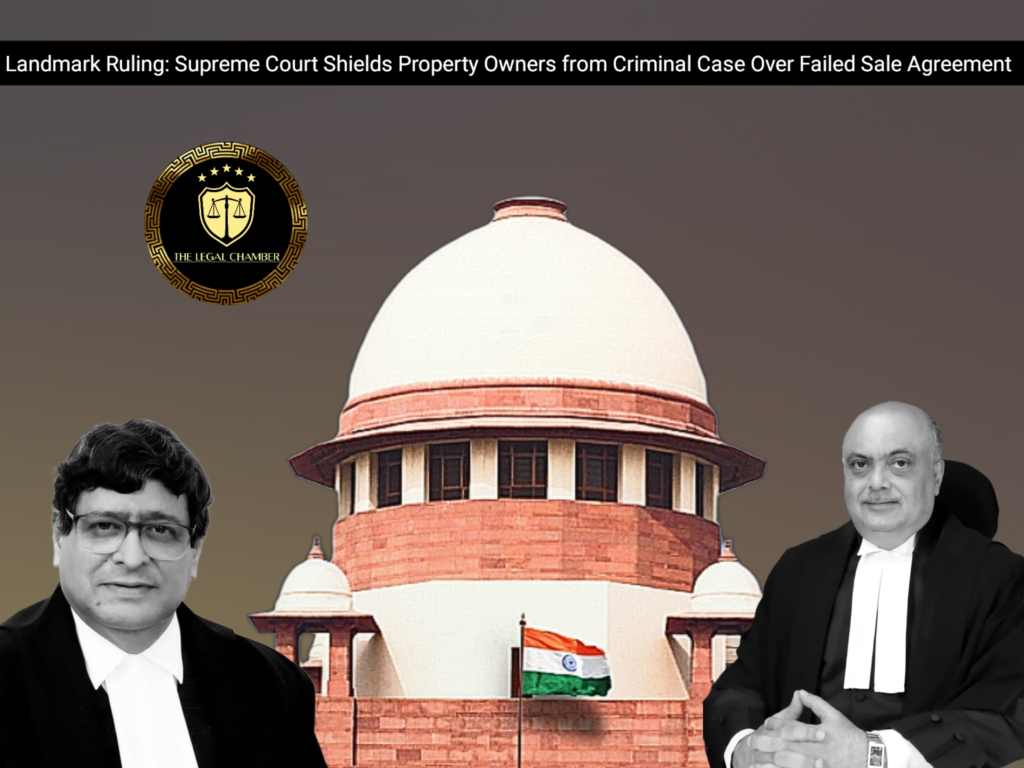
The Supreme Court quashed the FIR and criminal proceedings, holding that the allegations did not constitute offences under Sections 406 or 420 IPC. The dispute was essentially civil in nature, and the essential ingredients of criminal breach of trust or cheating—such as entrustment of property or dishonest inducement at inception—were absent. The Court emphasized that criminal proceedings cannot be used to settle purely civil disputes.
Facts Of The Case:
The case originated from a private complaint filed by respondent no. 2, Keerthiraj Shetty, alleging that the appellants (family members of the original landowners) had cheated him. The parties had entered into an Agreement to Sell (ATS) in 2015 for a property, with the complainant paying an advance. The appellants also executed a General Power of Attorney (GPA) in his favour. The core of the agreement was that the complainant would help resolve ongoing litigation concerning the property’s title. After the title issues were ostensibly cleared and the property’s market value increased, the appellants allegedly refused to honour the ATS. They revoked the GPA and executed a series of deeds, ultimately transferring the property to one of the appellants. This prompted the complainant to file a civil suit for specific performance and subsequently initiate criminal proceedings by filing an FIR for offences including cheating and criminal breach of trust. The appellants approached the High Court to quash the FIR, which was dismissed, leading to the present appeal before the Supreme Court.
Procedural History:
The procedural history began with the filing of a private complaint under Section 200 CrPC by the respondent no. 2 before the Magistrate. The Magistrate referred the complaint to the police under Section 156(3) CrPC, leading to the registration of FIR No. 260/2023. The appellants then filed a petition under Section 482 CrPC before the Karnataka High Court seeking to quash the FIR. The High Court dismissed the petition vide its impugned order dated 03.06.2024. Aggrieved by this dismissal, the appellants filed a Special Leave Petition before the Supreme Court, which granted leave and culminated in the present criminal appeal. During the pendency of this appeal, the investigation was completed, and a chargesheet was filed on 28.08.2024, with the Magistrate taking cognizance on 30.08.2024.
READ ALSO:Supreme Court Shields Daughters-in-Law from Criminal Case Over Property Will
Court Observation:
The Court observed that the essential ingredients for offences under Sections 406 and 420 IPC were conspicuously absent. It found no entrustment of property for criminal breach of trust, as the appellants were the owners, nor any evidence of dishonest inducement at the inception for cheating. The allegations indicated, at best, a subsequent failure to honour a civil contract. The Court emphasized that the dispute was inherently civil in nature, and allowing criminal proceedings to continue alongside the pending civil suit for specific performance would amount to an abuse of the process of the court. While the procedural lapse of not initially filing an affidavit with the private complaint was deemed curable and was subsequently complied with, the substantive allegations in the FIR nonetheless failed to disclose any criminal offence.
Final Decision & Judgement:
The Supreme Court allowed the appeal and quashed the FIR along with all consequential proceedings, including the chargesheet and the cognizance order, as against the appellants. The Court held that the allegations did not disclose the necessary ingredients for the offences of criminal breach of trust or cheating, and the dispute was essentially civil in nature. Exercising parity, the benefit of this quashing was also extended to a non-appealing co-accused. However, to secure the ends of justice, the Court imposed a restraint on the appellants from creating any third-party rights in the subject property until the disposition of a separate SLP filed by the BDA concerning the land’s title, allowing the complainant’s civil suit to proceed in the interim.
Case Details:
Case Title: S. N. Vijayalakshmi & Ors. vs State of Karnataka & Anr. Citation: 2025 INSC 917 Criminal Appeal No.: [@ Special Leave Petition (Crl.) No. 8626 of 2024] Date of Judgement: July 31, 2025 Judges/Justice Name: Justice Sudhanshu Dhulia and Justice Ahsanuddin Amanullah
Download The Judgement Here